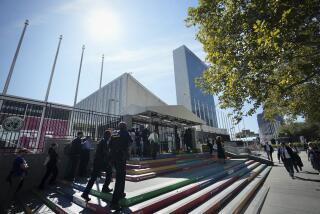U.N. Accused of Ignoring U.S. on Budget
- Share via
UNITED NATIONS — U.S. Ambassador Vernon A. Walters, citing increased frustration over the financial crisis in the United Nations, said Wednesday that the United States and its allies believe that their views on the organization’s budget are being ignored by the majority of the 159 member states.
Walters addressed a resumed session of the General Assembly after the Soviet Union criticized Washington for seeking to impose its will by cutting back on financial support to the international body.
U.N. Secretary General Javier Perez de Cuellar characterized the financial crisis as a political disagreement over how costs should be shared and money spent.
“The crisis, however, goes much deeper than that,” Walters told the assembly. “The United Nations is facing a crisis of confidence. Member states remain committed to the ideals of the United Nations--but member states no longer have confidence in the United Nations as an institution for effectively serving those ideals.”
Finances 25% of U.N. Budget
Walters said that the United States, which now finances 25% of the basic budget of the United Nations as assessed by a U.N. committee, for the first time has had to announce its inability to pay its full assessment of $210.3 million for 1986. He said that an amendment by Sen. Nancy Landon Kassebaum (R-Kan.) approved by Congress last year mandates a reduction of the U.S. share to 20% unless major contributors are given more weight in assembly voting on money matters.
However, because such action would require revision of the U.N. charter--opening up a Pandora’s Box of other issues--the Kassebaum mandate is unlikely to see fruition.
The U.S. envoy said that Gramm-Rudman reductions in total U.S. spending resulted in an overall drop of $80 million in Washington’s payment to the United Nations for 1985-86, an amount almost equal to delinquencies in payments by other members.
The Kassebaum amendment, he told colleagues, “reflects a dissatisfaction in the U.S. Congress over the fact that the countries that contribute the great majority of the organization’s money have little to say about how it is spent.”
More to Read
Sign up for Essential California
The most important California stories and recommendations in your inbox every morning.
You may occasionally receive promotional content from the Los Angeles Times.













